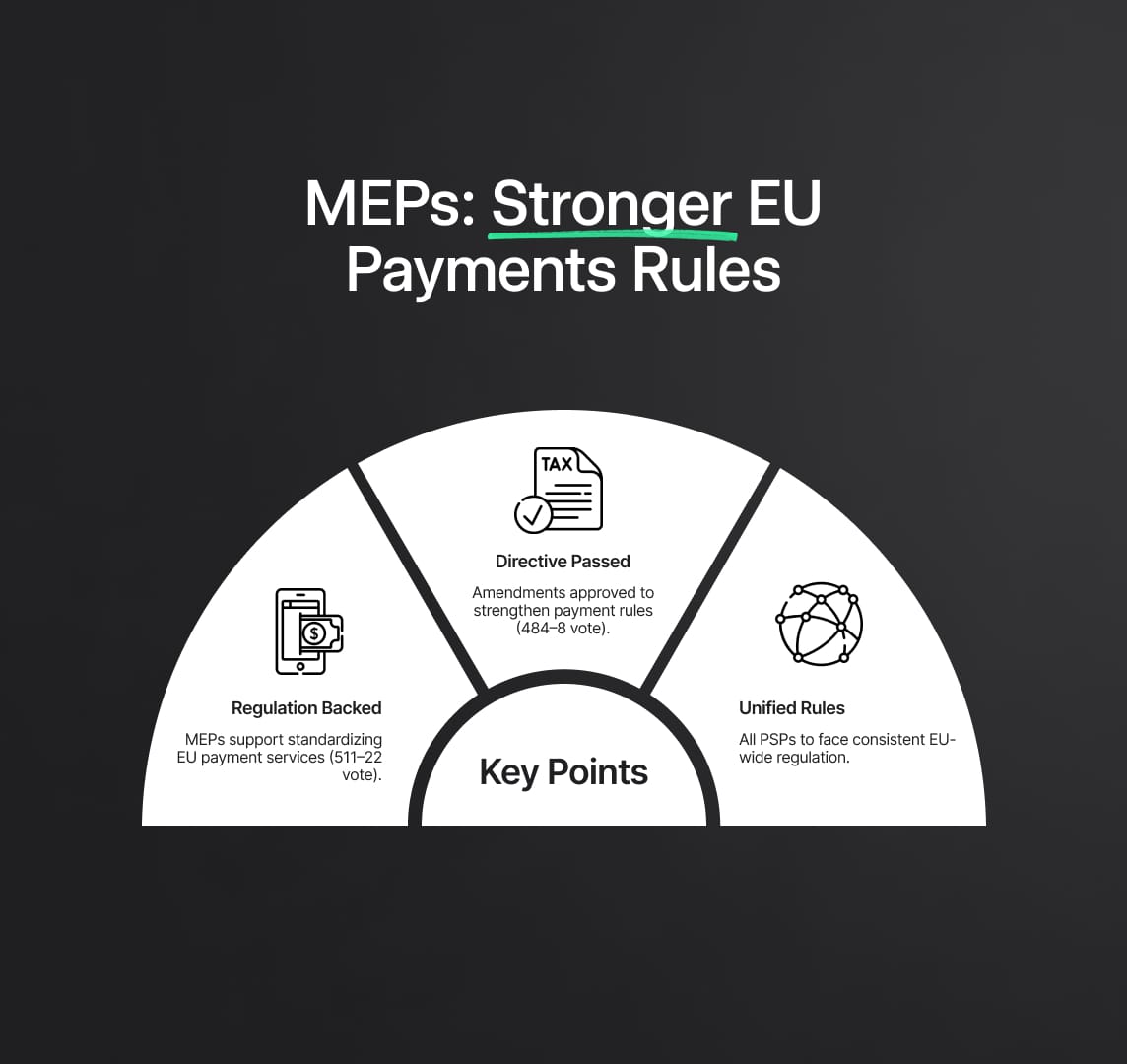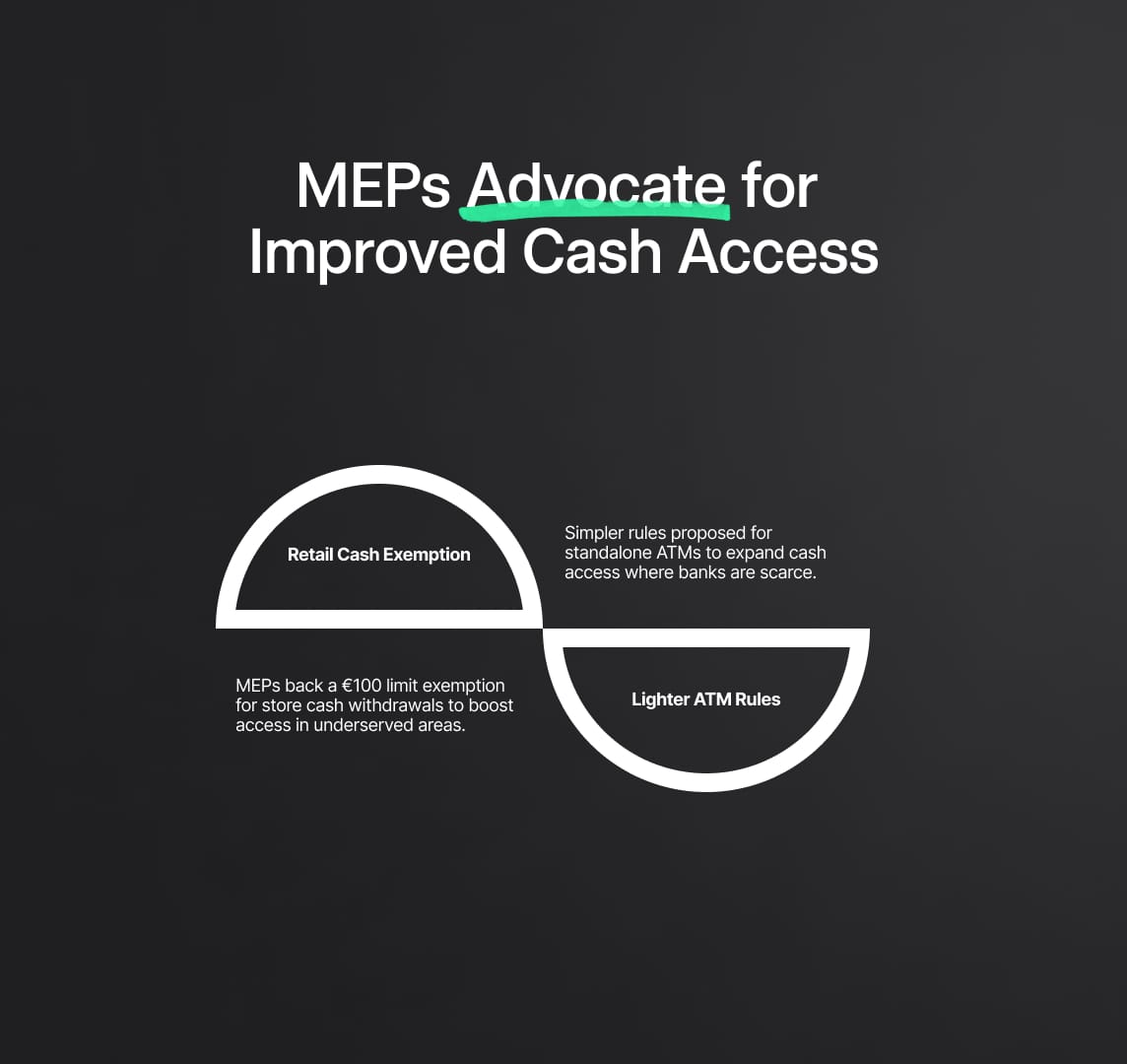PSD3 and Payment Services Regulation approval
On April 22, 2024, the EU Parliament adopted proposals for PSD3 and PSR, aiming for competitive, secure payment services. Changes include free verification of unique identifiers, transparent fee disclosure, better access to cash, and entry for new players in internet payments.

The European Parliament said on April 22, 2024, that it had adopted its first position regarding the Payment Services Regulation (PSR) and Payment Services Directive (PSD3). By taking this action, the EU hopes to improve payment competition and transparency while strengthening consumer protections against fraud and data breaches. Notably, with 511 votes to 22 and 484 votes to 8, respectively, the Parliament supported the proposed changes to the PSR and the Directive.
Source
[1]

MEPs Push for Enhanced Fraud Protection and Cash Access in Payment Services
In order to better protect customers against fraud and data exploitation, members of the European Parliament (MEPs) are pushing for major changes to payment services that also promote pricing transparency. They are highlighting how important it is to have mechanisms in place inside member states that guarantee access to cash, especially in isolated or rural areas. In an effort to promote fair competition and greater customer choice, MEPs are also striving to level the playing field between conventional banks and non-bank payment service providers.

MEPs Advocate for Better Payment Services Regulation and Directive in the EU
With strong customer protection measures against fraud and data breaches, the European Parliament recently enacted important proposals aimed at fostering an open and competitive financial service environment throughout the EU:
- Proposed modifications to the Payment Services Regulation: With 511 votes in favor and 22 against, coupled with 75 abstentions, MEPs' modifications to the Payment Services Regulation were overwhelmingly supported. The goal of these modifications is to provide more standardized electronic money and payment services within the EU.
- Additional Proposed Amendments to the Directive: The European Union's payment services framework was reinforced when the proposed amendments to the directive were enacted by the Parliament with 484 votes in favor, 8 against, and 118 abstentions.
- Harmonization Efforts: MEPs are working to harmonize payment and electronic money services more inside the EU. They want to make sure that all payment service providers (PSP), such as banks and post office giro institutions, are subject to the same regulations.
Improving Security Measures and Data Privacy in Accordance with PSD3 and Payment Services Regulation
Complying with the guidelines outlined in PSD3 and the Payment Services Regulation, MEPs have developed thorough plans to enhance payment transfer security and protect customer privacy. The requirement to verify unique identifiers, such IBAN, without levying extra fees is at the heart of these initiatives. In order to successfully prevent possible fraud efforts, Payment Service Providers (PSPs) are also required to develop strong consumer authentication measures. MEPs have emphasized PSP accountability by stating that those who do not implement sufficient fraud prevention measures will be responsible for paying customers' damages resulting from fraudulent activity.
Furthermore, customers are explicitly given discretion over how their personal data is processed, demonstrating recognition of the importance of data privacy. People have the right to give permission for data processing, and they also have the freedom to choose not to participate in data sharing programs or to remove access to their personal data at any time. In line with the main goals of PSD3 and Payment Services Regulation, these measures strengthen the security of financial transactions while simultaneously giving people more control over their personal data.
Promoting Fee Transparency: Key Tenets of PSD3 and Payment Services Regulation
Promoting fee transparency in payment transactions is one of the key points made by PSD3 and the Payment Services Regulation. Consumers have the right to obtain complete, understandable, and unambiguous information about all fees related to a payment transaction. This includes information on fixed fees for cash withdrawals, currency conversion fees, and any other relevant fees. These regulations seek to equip customers with the knowledge they need to make educated decisions and promote trust in the payment service ecosystem by guaranteeing cost structures are transparent.

Improving Access to Cash: Regulatory Changes Advocated by MEPs
MEPs, or members of the European Parliament, are pushing for improved access to cash, especially in rural and isolated areas of the EU. They suggest changing certain regulations to make it simpler to obtain funds in order to address this problem.
Main regulatory changes:
- Retail Store Exemption: MEPs propose lifting some regulatory requirements from retail establishments that provide cash withdrawals separate from a transaction, up to a maximum of €100. This exemption aims to improve access for those living in places with weak banking infrastructure by incentivizing retail businesses to offer cash services.
- Less Stringent Regulations for ATMs: In addition, MEPs suggest imposing less stringent regulations on ATMs that only serve as cash withdrawal machines and do not maintain payment accounts. By providing incentives for the installation of ATMs in underserved areas, this initiative seeks to ensure that locals have greater access to cash.
By addressing the issue of restricted cash availability in isolated or rural areas, these regulation measures hope to enhance financial inclusion and convenience for all EU residents.

Expanding Payment Services: Innovations Under New EU Regulations
There is a chance for new players to completely transform the market, especially in online payments, as a result of the new regulations that have been introduced in the EU payment services industry. These rules address liability, security, and data protection issues while attempting to make online shopping more convenient for consumers without the need for traditional credit cards.
New Payment Services Aspects:
- Authorization for Internet Payments: With a particular focus on internet payments, the new regulations permit the authorization of new participants in the EU payment services market. With the use of this authorization, suppliers are able to provide online payment options that let users make transactions without using credit cards.
- EU Standardization: These rules guarantee that the same terms, particularly those pertaining to electronic money services, are applied consistently throughout the EU for the provision of payment services. For customers and service providers alike, this standardization encourages consistency and clarity.
- Technological Neutrality: With a focus on technological neutrality, the laws are nevertheless adaptable to new developments and changing payment methods. This strategy upholds consumer protection laws and regulatory compliance while promoting ongoing improvements in payment services.
The EU legislation have led to the introduction of new payment systems that improve accessibility, security, and convenience in the digital payments space. This has encouraged competition and innovation in the industry.
Insights on PSD3 and Payment Services Regulation from Key Figures
The Payment Services Regulation's many advantages are emphasized by Marek Belka, the person in charge of it, including improved control over data access, better transparency in ATM withdrawals, and protection of consumers against fraud. Belka refutes eurosceptic views by highlighting the responsibility of internet platforms in preventing payment fraud and by reiterating the EU's commitment to the welfare of its inhabitants.
The directive's author, Ondřej Kovařík, emphasizes how important it is for ATM withdrawals to be transparent by guaranteeing that costs are displayed up front. Furthermore, by allowing retail establishments to provide cash withdrawal services, especially in rural regions, the directive hopes to strengthen the role that currency plays in society. Kovařík also highlights the need to harmonize and simplify the authorization process for payment providers within the European Union.
Key Highlights of New EU Payment Services Regulations
Significant improvements in EU payment services rules are highlighted in the recent news release, which also highlights increased accessibility, openness, and consumer safety. The goal of MEPs is to promote the security and reliability of payment transactions through the implementation of measures such free unique identification verification, enhanced client authentication, and transparent charge disclosure. Furthermore, efforts to increase cash accessibility, permit new participants in online payments, and harmonize laws throughout the European Union show a dedication to promoting creativity, diversity, and competitiveness in the dynamic payment services market. The aforementioned regulation amendments represent a significant advancement in establishing a payment environment that is safer, more transparent, and technology neutral for all parties involved in the European Union.
Reduce your
compliance risks

